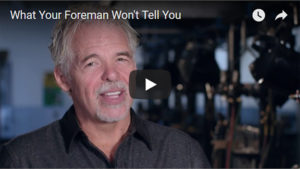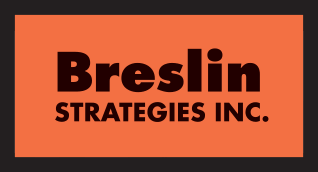10 Things Your Foremen Won’t Tell You
I bet you think you know most of your foremen pretty well. You don’t. Really.
They’ve been working for you forever, right? They like and respect you. But you haven’t really been paying enough attention. And they are holding back from telling you what you need to know. Your foremen are the backbone of your company. But, you may be missing a lot by making assumptions about who they are, what they think, and how they see themselves. And those assumptions are costing you hundreds of thousands (if not millions) of dollars in lost profits over the course of their careers.
Your foremen are the backbone of your company. But, you may be missing a lot by making assumptions about who they are, what they think, and how they see themselves. And those assumptions are costing you hundreds of thousands (if not millions) of dollars in lost profits over the course of their careers.
I’ve spent the last several years talking with and training more than 25,000 foremen all over the U.S. and Canada. So, what is going on under the surface is not my opinion; it is directly from and about them. And though there are many compelling messages and common themes, here are just 10 to get us started.
Top Ten Things Your Foremen Won’t Tell You
- Your foremen don’t see themselves as professionals. They don’t describe themselves that way. They don’t see it as a professional position – in fact, they barely see it as a management position. Most see themselves as the “craft person in charge.” Foremen will generally manage a total volume of $100,000,000 to $1 billion in projects throughout their careers. Why can’t they see that the position is one of professional leader, manager and coach? If they aren’t professionals, then what are they? Maybe we should help them see that they have graduated from being a blue-collar worker into something much more important.
- On average, your foremen have received zero formal, professional leadership and management training to prepare them for this high-level responsibility, role, and identity. This impacts net profit, client relations, quality, safety and productivity. Instead, we’re saying, “Here are your truck keys and the plans. Good luck.”
- Your foremen don’t know what they do for a living. When I ask them, a full 90% respond, “I’m a [Carpenter, Electrician, Pipefitter, Ironworker, …fill in the craft].” This is the wrong answer. It reflects a craft-worker mindset, not a supervisory one. The correct answer is, “I am a professional construction foreman.” It’s very difficult for them to make that jump and not feel embarrassed. But, how they see themselves determines how they act and lead on the job. They are no longer just “one of the guys”. They don’t permit themselves to change that identity.
- Your foremen rarely solicit input from their crews. They a) think they will look weak, b) worry that someone else will get credit for a good idea and take their job, c) would never think to ask, or d) don’t even know that it’s part of their job.
- Your foremen run their crews almost 100% of the time using authority, not influence. Which approach do you think is more effective, productive, and profitable?
- Your foremen are often stuck between the roles of “boss” and friend. This kills their ability to discipline and hold others accountable for their actions. Fully 50% of the foremen in my courses admit they are letting people slide or avoiding difficult conversations because of the friend vs supervisor conflict. They can fix it if we teach them how.
- Your foremen do not effectively delegate. They are get-it-done people and therefore over-participate in the action at the job site. They are excellent at directing tasks. They generally do not empower people and have not been taught by good examples.
- Foremen are the front lines of the culture of your company. How people are treated. How safety is reinforced. Why talent will migrate to you and not the competition. But they don’t see that. They think; “build the work” before “build the people and culture”. It’s not their fault, but no one has told them anything different.
- Your foremen do not often admit mistakes or failures. Failure is not a learning experience in their eyes; failure is simply failure.
- Your foremen do not know how to effectively motivate their crews. The most effective and well-documented tools of praise and positive reinforcement are generally entirely absent in our industry. What was not given to them will not be given to others.
I’m willing to guess a few of the items on this list didn’t come as a surprise to you. But what about those that impact you operationally and financially? So, the obvious question is, what are you doing to fix these attitudes among your foremen? By ignoring or delaying action on these problems, we own them.
Several hundred thousand foremen across North America are waiting for help. They’re doing the best they can with what they’ve got, but they need their contractors to help them understand how vital they are to their company and the industry. They need serious professional training, coaching, and support to become high-quality leaders and managers. They are the key to the growth and profitability of every contractor reading this. But, most of all, I think they’re waiting for you to acknowledge the challenges and give them a hand up in their journey.
Mark Breslin is the fourth generation of a construction family and has served in roles from field to CEO. He is ranked as the top-rated speaker, trainer, and author in the United States on construction leadership. He is also the author of five bestselling books that have created profound and positive change across the industry. He has spoken to and inspired more than 400,000 construction leaders during his career at locations including the Raider Stadium, The Freedom Tower, and the largest data centers, solar farms, and industrial facilities in the world.
Please view his latest book The Five Minute Foreman or his collection of five at the store.
And…check out Mark’s New Video Coaching Tool – Professional Construction Leader (PCL) Video Coaching Series for Field Leaders. You can train and develop your field leaders without pulling them off the jobsite.
